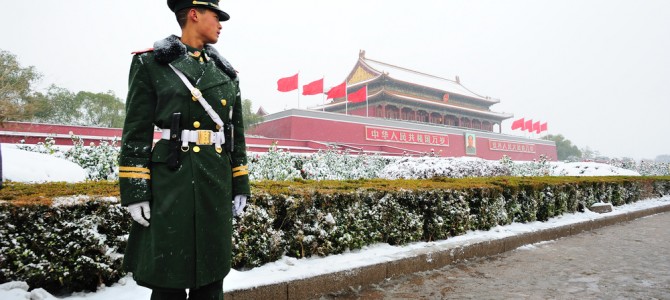
May 16 marked the 50-year anniversary of Mao Zedong’s Cultural Revolution, a movement that was probably the darkest chapter in China’s history. The name Cultural Revolution is very misleading. It should be called “Cultural Destruction,” as it aimed to control every aspect of an individual’s life: how much one could eat; what, if any, education one could get; whom one could work for; where one could live; what entertainment one could have; what thoughts one could have.
The Cultural Revolution brought ordinary people nothing but suffering. There was a shortage of everything: food, cooking oil, cloth, bicycles, and so on. Everything was rationed via stamps. For instance, every person, adult or child, received an allotment of three ounces of cooking oil each month. Meat was hard to come by. Families who were fortunate to get hold of some pork would use the pig lard to supplement cooking oil.
We Treated Pig Fat Like Treasure
At this time, my mother was pregnant with my sister. My father was traveling for business in Shanghai, the largest and most developed city in China. He desperately looked for something nutritious he could bring back to his wife and unborn child. Someone told him a local cafeteria was killing a pig for the upcoming Chinese New Year celebration.
He knew they wouldn’t sell him any pork because private transactions like that were strictly forbidden. But he was a very persuasive man, and he could be persistent. He was able to convince the cafeteria staff to give him some pig lard. In exchange, he offered his engineering skills to fix the oven for them.
By the time he got on the train back to Zigong, the small town in Western China where his family lived, his most precious cargo was a small aluminum pot that contained pig lard. The train ride home was about 12 hours long, and the train was crowded with half-starving, hollow-looking people. He knew a pot of pig lard would be enough to cause a riot. Nothing strips humanity away like hunger.
Thankfully, my father always had a quick wit, so he told the people who surrounded him that the pot contained highly secret equipment for the Cultural Revolution. If anyone touched it and caused it to malfunction, he would be a counter-revolutionary. Being accused of being a counter-revolutionary was a serious crime in China. It meant labor camp, persecution, or even death.
My father put Mao’s little red book on top of the pot and then let the pot sit in the center of the folding table. For 12 hours on a crowded train full of hungry people, nobody touched the pot. That was how my father got the pig lard home to his pregnant wife and their unborn child.
Collectivist Mind Games Can Be Deadly
Not everyone had the kind of resolve my father had. The limited food ration was especially hard on his coworker Big Li, so called because he was a big and tall guy. One Sunday morning, he went to the cafeteria to get steamed buns for breakfast for his wife and three children. He bought five buns.
Initially, he ate his share, because he was too hungry to wait. Then he talked himself into eating another one, because he reasoned that his two younger kids could share one. One by one, he ate all five buns before he walked out of the cafeteria. When my father discovered Big Li, Big Li was sitting by the side of the road, crying. He told my father what had happened and that he was too ashamed to go home to face his hungry family.
He told my father, “I am a selfish pig. No, I am worse than a pig.” My father took two steam buns from his basket, put them in Big Li’s hands, and said to him, “This is all I can spare. Go home and bring this to your family. Remember, you are a man.” Big Li brought the two buns home, but he couldn’t face his wife’s disappointed gaze and his kids’ hungry cries. He chose to end his despair by jumping into a lake.
People in the community avoided discussing Big Li’s death, because people who committed suicide were believed to have crimes to hide. Ordinary citizens like Big Li were not the only ones caught up in man-made tragedies. Events that were even more shocking took place in China.
To Deny Freedom Is to Deny Humanity
In October 1968, Chairman Liu Shaoqi was expelled from the Communist Party in spite of the numerous self-criticisms he had made both publicly and privately. He became Enemy Number One of the Communist Party. No one ever saw him in public again. He was thrown into a secret jail without trial even though he had held the office of the president of China.
Shortly after, he died in jail after extensive torture and disease. He was cremated right away under a fake name. None of his family knew he had died until years later. Of course, very few people in China learned about Liu’s fate until the Cultural Revolution was over.
Liu, the president of China, and Big Li, an ordinary citizen, had one thing in common: the Chinese Communist Party neither recognized nor protected their right to life. In his speech to a joint meeting of Congress on June 27, 1990, Nelson Mandela said, “To deny people their human rights is to challenge their very humanity.” China’s Cultural Revolution was Mao’s war on humanity. This historical lesson shouldn’t be forgotten, and it needs to be told inside and outside of China.









